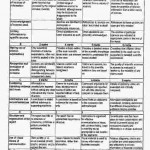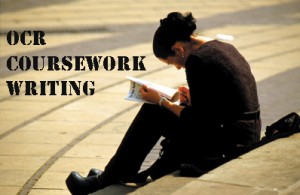
OCR Coursework Writing Help
What is OCR Coursework?
OCR stands for Oxford, Cambridge and RSA and is a leading examination board in the UK. The board provides a wide variety of qualifications at all levels, including school, college, university and in the workplace. More than 10,000 schools throughout the UK offer OCR qualifications. In general, OCR qualifications fall into one of two categories: general or vocational. They are then divided into various different levels. Gaining an OCR qualification will require you to complete a mixture of both coursework and exams.
The aim of OCR coursework is to encourage a practical approach and prepare you for further study. The coursework is very research orientated, so be prepared to use various analytical tools such as graphs, charts and surveys. The whole point of OCR coursework is to teach you to plan, research, develop and evaluate your findings, and final marks are based on the quality of this as opposed to the outcome of whatever project it is you are working on. Remember that all OCR courses have a “reader”, that is distributed to the students, which you should use while completing your coursework assignments. Continue reading to learn more about different types of OCR coursework, and possible OCR qualifications.
 Quick Navigation through the OCR Coursework Page
Quick Navigation through the OCR Coursework Page
- What is OCR Coursework?
- OCR Coursework Example
- Different Types of OCR Coursework
- How Can We Help
- OCR Qualifications
Download Free Sample of OCR Coursework Guidance
Different Types of OCR Coursework
There are various different types of work which can be utilized when completing OCR coursework. Your coursework may include a mixture of the following:
- Essays. These will be based on the material that is relevant to the unit you are working on, and may be given in the form of a question or perhaps an essay prompt. Essays will need to discuss whatever the topic is, and include evidence both for and against to back up whatever conclusion you come up with.
- Projects and coursework writing. These can be completed in various different ways, including reports and investigations. Projects give the student quite a generous leeway, and within reason can be on any subject you choose as long as it is relevant to the area of study.
- Questions and answers. If you are set questions then you’ll need to research and make informed answers. Depending on your tutor, some may require 5-10 point answers, and others require answers in the form of paragraphs.
- Utilizing the internet with e-portfolios. This is basically a storage and uploading area where students pass their work to the tutors and assessors. The trainers also assign work and projects, and you’ll be able to keep track of the units completed and those still to do. It differs from traditional paper projects and allows students to present their evidence in a large variety of ways. These will include documents, spreadsheets, video and audio files.
How can we help
As with any type of coursework writing, we understand that sometimes life can get in the way. Before you know it an assignment deadline has crept up on you and you’re simply not prepared. In this scenario it might be necessary to get a little outside assistance and get writing help from a trusted source.
Although ProfEssays.com is a US based company, we have plenty of professional native UK writers who are extremely experienced in producing OCR coursework. Some students find it a challenge to provide work of a high enough standard to gain the grades they require, but our essays are all written by experts who know exactly what to write to ensure you top grades. Every piece of coursework writing is individually produced to your specification, and is unique. You can order your coursework from us, safe in the guarantee that it has never been used before, nor will be ever used again.
So no matter what your reason for needing a custom written paper, drop us a line to place your order.
OCR Qualifications
The following are examples of qualifications offered by the OCR examination board:
- GCSE – The General Certificate of Secondary Education.
GCSEs are taken at secondary school (also known as high school) and are available in most subjects. This type of qualification entails GSCE coursework and one or two examinations. Once you have gained a GCSE it’s then possible to move onto further qualifications such as AS and A Levels.
- AS and A Levels
AS stands for advanced subsidiary and A stands for advanced level. They are typically taken after gaining GCSEs and are the most popular route into university.
- NVQs
National Vocation Qualifications are taken in the workplace. They range from level 1 – 5 and are available in many disciplines. In the main they are judged by performance in the workplace along with OCR coursework and various types of questioning
- CLAiT – Certificate/Diploma for IT Users
The Computer Literary and Information Technology certificate is available in three levels. Level 1 is for complete beginners and level 3 is the equivalent to an NVQ level 3 or an A level.
 + 1-888-827-0150
+ 1-888-827-0150 + 44-20-3006-2750
+ 44-20-3006-2750













